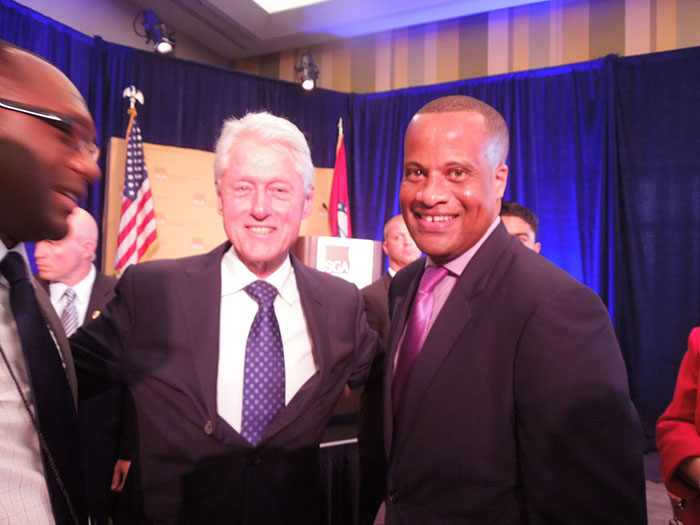
September 2014
In This Issue
Success Story: Workforce Training is Not One Size Fits All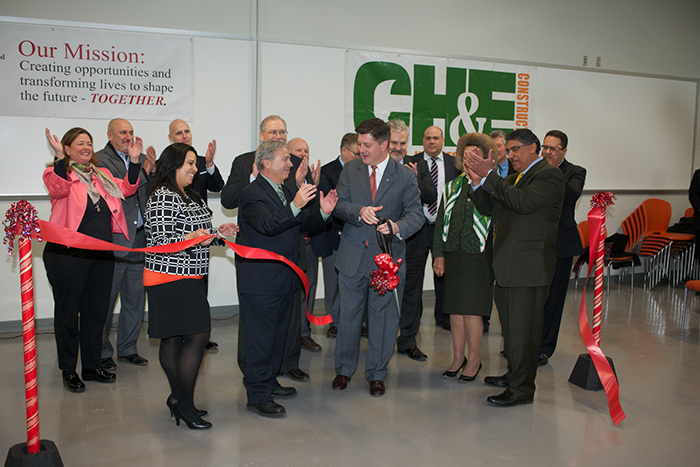 Officials cut the ribbon to open Tec Centro in Lancaster, Pa.
Ensuring employers have a well-trained workforce with the skills employers need is key to economic growth. But it’s impossible to learn a skill if you don’t understand the instruction being given or if there are cultural barriers to the training. Culturally appropriate workforce training is crucial to ensuring a properly trained workforce in many parts of the country, and EDA has supported projects to provide that training in areas ranging from Pennsylvania to California. In 2011, EDA announced a $1.3 million grant in Lancaster, PA to the Spanish American Civic Association (SACA) and the SACA Development Corporation of Lancaster to help renovate a vacant facility for use as the state-of-the-art Bilingual Technology Training Center. The center would extend bilingual and remedial training opportunities to prepare low-income minority clients for high-demand growth jobs in the Lancaster region Today, Tec Centro is the only bilingual technology center in Pennsylvania. It operates in collaboration with the Lancaster Workforce Investment Board, the Harrisburg Area Community College, area employers, corporations, the faith based community, and community & corporate foundations Since Tec Centro formally opened in February 2014, it has admitted 100 neighborhood residents into English as a Second Language and Adult Basic Education courses and has a wait list with more than 100 individuals who also want training services. Recently, Tec Centro offered its first Certified Nursing Assistant Training to 10 individuals, and all graduates were placed in full time employment. “It is our intent to provide services to 300 unemployed and underemployed residents of the community in a year’s time,” said Carlos Graupera, President of the Spanish American Civic Association. “Given our initial rush of clients, we can clearly see that we will meet and exceed that goal.” By September 2014, Tec Centro will have all core training areas in operation, including:
EDA has made similar investments in other EDA regions as well. In 2007, EDA gave a grant of $1.5 million to the Albuquerque Hispano Chamber of Commerce foundation to construct a new building with additional classroom space for business development and job training programs on the campus of the Barelas Job Opportunity Center of the Albuquerque Hispano Chamber of Commerce. The facility provides a complete array of educational services and programs designed to improve the educational opportunities and experience of Hispanic and community members in order to create a job ready and well trained employee base for both small and large companies in the Albuquerque metropolitan area. The BEOC also offers working partnerships with many resources and partners such as the Small Business Administration, the New Mexico Department of Labor, Qwest, the Workforce Connection of Central New Mexico, the National Council of La Raza, Comcast, and Youth Development, Inc. Designed to address the training, employment and entrepreneurial needs of the business community, the BEOC affords the AHCC member an invaluable roster of resources and services. In 2009, EDA gave the Fresno Area Hispanic Foundation $1.7 million to create the “Downtown Business Hub.” The project help grow businesses in the economically distressed areas of Fresno, as well as other economically distressed communities in the County of Fresno. The incubator focuses on companies in target industries such as Internet web design, graphic design and custom manufacturing and provides start-ups with a range of entrepreneurial and financial assistance, such as microloans, and training in readiness business management, business plan development, and licensing and regulatory requirements. FAHF anticipates that the incubator will create 900 new jobs and generate $36 million in private investment nine years after renovation completion. Just as it is crucial to ensure that workers are trained with skills employers need, it is also crucial to ensure that the needs of the people being trained are met. There is not a one-size-fits-all workforce development curriculum. These EDA grantees understand the needs of their communities and are working to meet them. Spotlight: EDA Participates in High-Level Economic Dialogue (HLED) with Mexico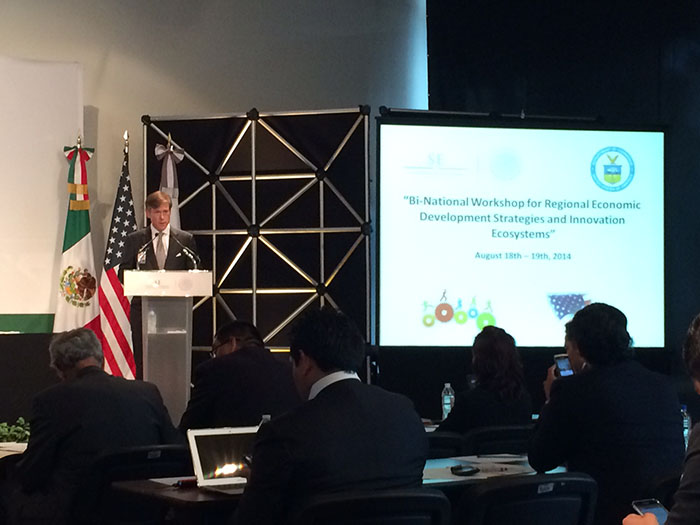 Deputy Assistant Secretaries Matt Erskine and Tom Guevara participate in the Bi-National Workshop for Regional Economic Development Strategies and Innovation Ecosystems in Mexico.
Economies don’t fit into neat borders of cities, counties, or states. Along the U.S.-Mexico border, they don’t always fit neatly into countries either. There are roughly 2,000 miles of shared border between Mexico and the United States that create a dynamic commercial relationship that generates more than $500 billion in two-way trade and supports millions of jobs in both countries. Recognizing this, in May 2013, President Obama and President Peña Nieto announced the formation of the High-Level Economic Dialogue (HLED) to promote economic growth in both countries, create jobs for citizens on both sides of the border, and ensure that the United States and Mexico could compete globally. The first HLED was launched in September 2013, which developed a work plan based on the pillars of promoting competitiveness and connectivity; fostering economic growth, productivity, entrepreneurship, and innovation; and partnering for regional and global leadership. The initiative is spearheaded by Department of Commerce’s International Trade Administration, and EDA has worked with ITA on several key areas:
Deputy Assistant Secretaries Matt Erskine and Tom Guevara traveled to Mexico last month to join in discussion about the Border Regions Economic Development Strategy (BREDS) to lay the foundation for future planned conferences. They stressed the fact that in the border region, U.S. and Mexican communities have unique advantages in context of their assets, capabilities, and culture. These cross-border regions should work jointly to understand their local assets and market themselves as comprehensive economic regions that can serve the Mexican, American, and global markets. BREDS is an economic road map that intends to diversify and strengthen the local economy. It aims to:
EDA also seeks to build on the recently launched Cluster Mapping Registry and facilitate the alignment of the standards for mapping clusters and regional economies to develop a shared registry of cross-border regions. Finally, EDA has been an active participant in the Americas Competitiveness Exchange program, helping to show delegates from all over the Western Hemisphere what can be accomplished with strategic investments and effective public-private partnerships. We share more than a border with Mexico. In many places, there is a symbiotic economic relationship between our two countries. We are now working together to ensure success and prosperity for both economies and both countries, and these HLED efforts are an important first step. Highlight: When It Comes to Innovation, Size Does NOT Matter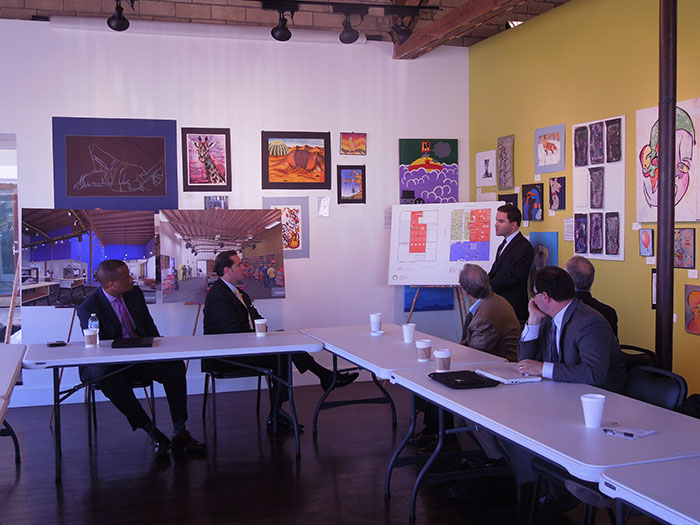 Assistant Secretary Williams and DRA Federal Co-Chairman Chris Masingill participate in roundtable discussion with Arkansas entrepreneurs at the AR Innovation Hub
There is a perception that innovation and entrepreneurship happen on the coasts while the rest of the country gets left behind. Yes, there are many places in America where the airports are so small you have to travel by puddle jumper to get there, and there is not a proliferation of a certain ubiquitous coffee shop on every block. But when it comes to innovation, size doesn’t matter. Small towns and cities across the country are doing some truly amazing things to support their innovators and entrepreneurs. Recently, Assistant Secretary Jay Williams and DRA Federal Co-Chairman Chris Masingill traveled to Tennessee, Missouri, and Arkansas to meet with local entrepreneurs at the incubators and training facilities that support them to see what innovation looks like with a touch of Southern hospitality. After arriving in Memphis, Assistant Secretary Williams and Chairman Masingill met with several entrepreneurs at Memphis Bioworks, an organization that seeks to create companies, jobs, and investments in bioscience. Some of the solutions presented by companies are brilliant in their simplicity. EndoInSight is a company started to reduce the discomfort of colorectal cancer screening, and Restore Medical Solutions is working to reduce surgical site infections with a simple u-ring for surgical instruments. TriMetis connects research entities with hospitals and providers who have excess tissue from samples taken for testing. It’s essentially taking a waste product and using it for potentially life-saving research. So much is coming out of Memphis Bioworks that they were conducting a “Shark Tank” like event for entrepreneurs that same day to help participants find funding that could take their ideas from concept to market. While innovation cannot be taught, it can certainly be encouraged. From Memphis, they traveled to Cape Girardeau, Missouri to tour the Cape Girardeau Career and Technology Center, which is training students of all ages in fields like advanced manufacturing and robotics. The courses span all industries and skills building, from service industries to engineering, in order to empower students to pursue jobs that will strengthen the Cape Girardeau area economy and the rest of the region. 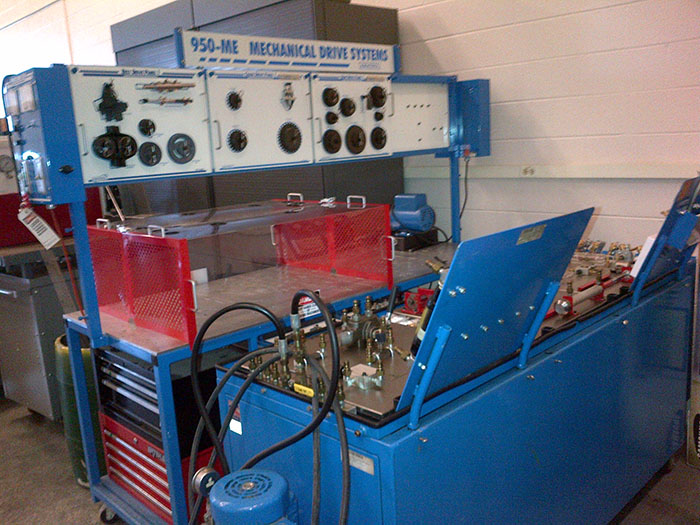 Advanced Manufacturing Training Equipment at the Cape Girardeau Career and Technology Center
The final stop on this whirlwind innovation tour was Little Rock, Arkansas. The Southern Governor’s Association Annual Meeting was held in Little Rock, and Assistant Secretary Williams had been invited to speak on a panel about creating communities of innovation. That morning, he got some additional inspiration on the topic at The Innovation Hub. At a roundtable at the Hub, Assistant Secretary Williams had the opportunity to hear from more than 20 entrepreneurs working in and around Little Rock to build Arkansas’ economy. Former President Bill Clinton offered the keynote address at the conference and said something incredibly poignant about the times we live in: “We are living at a breath-taking moment of possibility. And, if we blow it, shame on us!” 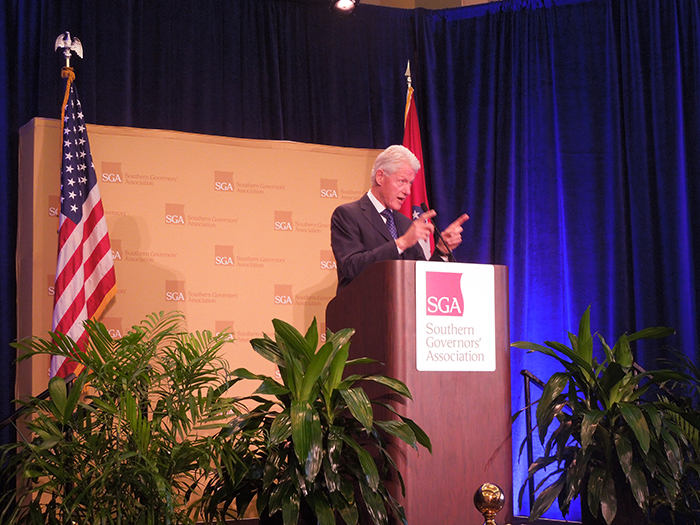 Former President Bill Clinton addresses Southern Governors’ Association Annual Meeting in Little Rock, Arkansas
That possibility he spoke of exists everywhere. Technology has made it possible for people to work and create anywhere – even a town without a Starbucks. It’s all of our responsibility to support and nurture innovation and innovators in big cities and tiny towns. |
|
|
|||
Host A Manufacturing Day Event Manufacturing Day is Friday, October 3, 2014, and we need you to consider hosting a manufacturing day event! Manufacturing Day provides manufacturers and economic developers a unique opportunity to expand the knowledge about the great benefits of a career in manufacturing and demonstrate the industry’s value to the U.S. economy. Companies can also use this day to educate their communities on the services and goods they manufacture. Whether through a plant tour for community partners or an open meeting with your organization’s leadership and elected officials, Manufacturing Day is a great way for you to increase public awareness of the manufacturing industry. Visit www.mfgday.com to register your organization’s Manufacturing Day event and find tools and tips to help you execute your Manufacturing Day event. Be sure to check out the Manufacturing Day Host Toolkit to see all the best practices and sample ideas that will help you plan a great event. 2014 National Disaster Preparedness Report Issued by FEMAThe Federal Emergency Management Agency (FEMA) has issued its annual National Preparedness Report outlining the nation’s progress and capabilities to deal with major disasters in 2014. The report specifically calls out EDA (see pages 66-67) for its efforts to aid with recovery and resiliency planning. Mapping the Midwest Future: Cluster Mapping EventWe hope you will join us for the official launch of the new U.S. Cluster Mapping website September 29-30 at Mapping the Midwest Future: Regional Innovation Clusters and Competitiveness, hosted by the University of Minnesota, Humphrey School of Public Affairs. This conference will be a Midwest convening across 12 states and four Canadian provinces. Harvard Business School Professor Michael Porter will discuss how an innovative U.S. Cluster Mapping tool developed for the U.S. Economic Development Administration can be used to map industry clusters and enhance regional competitiveness. Deputy Assistant Secretary Matt Erskine is slated to particiapte. Other speakers will include Matt Rose, executive chairman of BNSF Railway and Doug Baker, chairman and CEO of Ecolab, Inc., as well as business, policy, and academic leaders. Learn More & Register Join NIST MEP Manufacturing Workforce WebinarNIST MEP is co-hosting a webinar on Sept. 25 from 2-3:30 “Building a Manufacturing Talent Pipeline” along with the American Association of Community Colleges and Siemens, Inc. The webinar will highlight a regional partnership between a consortium of colleges, a Mass MEP, and the advanced manufacturing industry. The Massachusetts MACWIC has produced an industry-endorsed stackable credential model and a pipeline of talent for a range of manufacturing companies in need of skilled workers. Click for more information and to register. |

